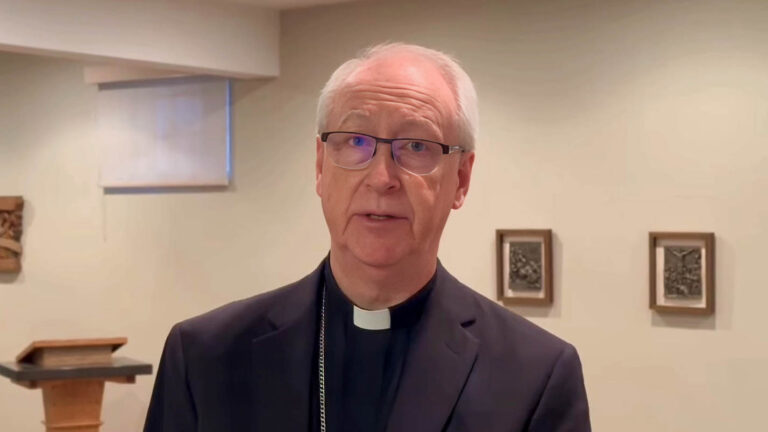Memorial of Saints Joachim and Anne 2024
Homily
[Sirach 44:1,8,10-15; Psalm 132; Matthew 13:16-17]
Over the last number of years, I have had the great blessing of sitting down many times with Indigenous Peoples in a sharing circle, or in what I have also heard referred to as a listening circle. This privilege was granted to me not only in the Edmonton area but also in regions across the country as I joined with many other people in preparation for the papal visit, whose second anniversary we commemorate these days. In these circles, the Indigenous women and men who participated taught me a lesson which I consider invaluable, one for which I shall be forever grateful. It is simply this: in listening to the voice of another, we must listen in order to hear.
Within the circle, the one who speaks receives the full attention of all other participants. Often holding an eagle feather, the speaker expresses from the heart whatever he or she wishes to share. Everyone else listens in silence for whatever length of time the speaker needs. There are no interruptions, no efforts to cut short what is being offered. This reflects a profound respect for both the person of the speaker and the content of the sharing. Whatever is said is worthy of being heard. Everyone listens deeply in order to hear rightly. They listen in order to hear.
How different this is from the way people relate to one another in non-Indigenous culture! It is rare that we listen at all to others’ voices, caught up as we are in our own self-pursuits. When we do listen, it is usually in order to react, criticize, cut off, or shout over. Lately there has also developed the tendency to cancel the voice of another even before anything is spoken. Walking together with the Indigenous has taught me how wrong all that is. The only listening worthy of the name is that which seeks to hear, that wants to know and learn from what resides in the heart of another, and is even ready and willing to be challenged by what is said.
Let’s now keep this in mind as we listen to Jesus speak in today’s Gospel text. He says to his disciples: “Blessed are your ears, for they hear.” In the background is the negative reaction given by many listeners to what Jesus has been saying. They listen to him, but in order to reject his teaching. By way of contrast, the disciples have been listening in order to hear Jesus, that is, so as to understand and be transformed by his words. As I listen to this today, I am reminded that, as a Christian, I must seek first the voice of Jesus before all others. He is, after all, the Son of God made flesh, the one in whom God’s very Word is spoken to us. He is the source of all wisdom; moreover, he is wisdom itself. And as I listen to Jesus, I must apply the lesson taught me by Indigenous Peoples. This means listening to the Lord in order really and deeply to hear him, to understand and be challenged by him, so that from his every Word I may be led out of my sin and selfishness toward the fullness of life.
When I ponder this lesson here at the sacred site especially dear to our First Peoples, another learning emerges, namely how Indigenous tradition is often a reflection of God’s own wisdom, given in Jesus Christ. I have been listening for some time now to the lived experiences of the Indigenous Peoples of this land, listening in order to hear. Their voices often echo in my heart as I also fulfill my Christian duty to listen to the Lord Jesus. Many are the times I have realized that, in listening to voices of Indigenous women and men, I have heard echoes of God’s revelation in Christ. As, for example, I listen to Indigenous Peoples say that the Creator is never to be eclipsed, I hear again the teaching of Jesus to seek first the kingdom of God; or as I listen to First Nations, Métis, and Inuit Peoples call on everyone to respect the land as God’s gift, I hear reverberations of the Christian proclamation that Jesus is the One through whom all things came to be.
At this place dedicated to the honour of Saint Anne, the kokum of Jesus, one beautiful aspect of Indigenous wisdom stands out as a particular reflection of divine teaching. On these holy grounds, we shall listen to many voices lifted up in praise of our elders, honouring in a special way grandparents from whom their grandchildren receive the cultural teachings, traditions, language, and protocols. As we listen to these voices, we hear an echo of the ancient teaching of God Himself, recorded in the passage from Sirach for this mass: “Let us sing the praises of our ancestors in their generations.” From them, he says, we learn how to live rightly, in fidelity to the covenants God has made with us, and the commitments we make to one another. Sadly and tragically, the elderly of our world today often experience not respect but neglect, and their voices, rather than listened to, are forgotten. We need to listen to and hear once again the profound respect of Indigenous Peoples for the elders, particularly as it reflects God’s own tender love for them.
Listening in order to hear. I pray that this lesson I have been taught by Indigenous Peoples will be learned by everyone. It is needed if we are to continue along the path of reconciliation, as Pope Francis urged us all to do when he visited two years ago. When we learn to show respect to one another by a deep, mutual, and respectful listening, then will our ears be truly blessed, because they will hear the voice of Jesus calling and encouraging us to live together in good ways. What is more, not only will our ears be blessed; so, too, will our eyes. “Blessed are your eyes,” Jesus said to his disciples, because they looked upon him in whom God was reconciling the world to Himself. As we listen to each other in order to hear, may the Lord Jesus bless not only our ears but also our eyes so that they may behold, in our day, the true reconciliation our ancestors have longed for generations to see.
Most Reverend Richard W. Smith
Lac Ste Anne Pilgrimage Site, Alberta
July 24th, 2024



